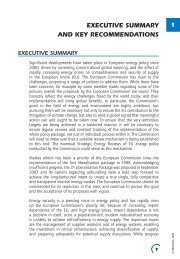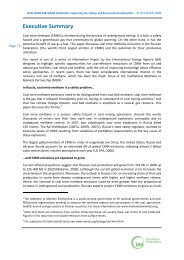Facing China's Coal Future - IEA
Facing China's Coal Future - IEA
Facing China's Coal Future - IEA
Create successful ePaper yourself
Turn your PDF publications into a flip-book with our unique Google optimized e-Paper software.
<strong>Facing</strong> China’s <strong>Coal</strong> <strong>Future</strong>: Prospects and Challenges for CCS © OECD/<strong>IEA</strong> 2011<br />
Page | 32<br />
CCS demonstration projects and early commercial projects are expected to be more expensive<br />
than later projects, and costs are expected to decline as experience is gained and the technology<br />
moves along its learning curve (Riahi et al., 2004) (Figure 5.1). Public‐private partnerships (PPP)<br />
and targeted incentives need to be further explored at this stage in order to address the<br />
commercial gap, accelerate deployment and drive down both costs and risks. Substantial public<br />
funding support is needed to mitigate high costs and risks, but governmental support levels<br />
should decline with experience, technology improvements and market development.<br />
Figure 12 The commercial gap for CCS technologies<br />
*The commercial gap (additional cost of technologies compared to conventional technology) is a major barrier to large‐scale<br />
demonstration projects and early commercial deployment. Current CCS financing and risk‐sharing mechanisms are insufficient in both<br />
OECD and non‐OECD countries. The extent to which CCS is deployed largely depends on the provision of stronger incentives, industry<br />
developments and international cooperation.<br />
Source: McKinsey, 2008.<br />
A number of CCS financing mechanisms and incentives are available, but none are sufficient to<br />
fully address the magnitude of the commercial gap. There is a strong consensus among experts<br />
in the CCS community that governments must offer a more robust suite of incentive policies and<br />
financing tools to help mobilise large volumes of private capital. There is also an assumption that<br />
OECD member countries must support CCS demonstration projects in developing countries, but<br />
issues related to broad climate policy uncertainties make commitments uncertain. Despite a<br />
number of proposals and discussions on these critical financing issues, there have been limited<br />
policy actions. CCS funding models and financing options remain insufficient in OECD countries<br />
and are just beginning to emerge in developing countries and China. Given the magnitude of CCS<br />
deployment needs both globally and in China, it is crucial to develop financing mechanisms<br />
matched to the scale of the challenge.<br />
Financing sources and schemes<br />
To respond to the large CCS investment challenge for China, there are a number of existing and<br />
potential domestic and international financing options that might be used to advance large‐scale<br />
CCS implementation in China.
















